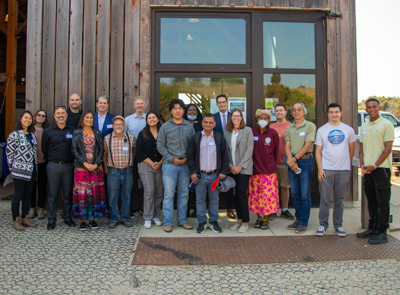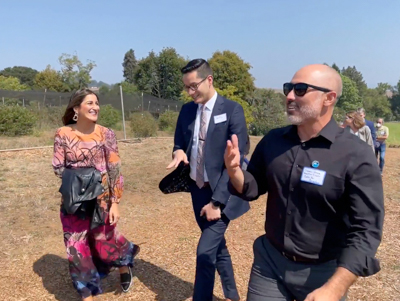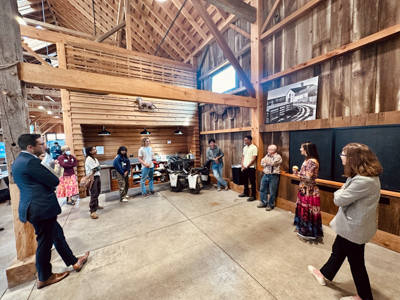United States Department of Agriculture (USDA) representatives visited the University of California, Santa Cruz to learn more about the campus’s USDA-funded research and workforce development programs.
The Sept. 21 visit began at the Hay Barn, where UC Santa Cruz faculty, staff, and students shared information about USDA-funded research and education projects with special guests from the USDA, including:
- Deputy Undersecretary of Agriculture for Research, Education, and Economics Sanah Baig
- National Program Leader for the Division of Community and Education Dr. Carlos Ortiz
- Associate Area Director for the Agricultural Research Service Dr. John Dyer
- Special Assistant to the Chief of Staff Caitlin Balagula
“We were really honored to welcome the representatives from the USDA,” said Stacy Philpott, professor of Environmental Studies, faculty director for the Center for Agroecology, and Alfred & Ruth Heller Chair in Agroecology. “I was blown away by all of the students and faculty who jumped in to tell their stories and by all of the thoughtful questions and insights shared by the USDA staff. It was exciting to revisit all of our accomplishments together and share that with the funders that make our work possible.”
Philpott and Center for Agroecology Executive Director Darryl Wong shared presentations on USDA-funded workforce development projects focusing on increasing opportunities and support for learners from underrepresented populations to create a more diverse food and agriculture workforce. These projects include a new multi-campus UC partnership to improve and expand undergraduate education in organic agriculture and a recently-awarded $10 million NextGen grant to cultivate diverse food and agriculture professionals who are equipped to advance equity in food systems.
“NextGen is an incredible focus for the USDA and for Secretary (of Agriculture) Vilsack and President Biden,” Deputy Undersecretary Baig shared. “We’re thinking about this as an opportunity for UC Santa Cruz to develop and share best practices with institutions, leaders, faculty, and students all over the country that are aligned in this mission and this vision.”
The USDA representatives then learned how UC Santa Cruz researchers are working to develop solutions to challenges in the field of agriculture through projects such as Assistant Professor of Electrical and Computer Engineering Colleen Josephson’s research on measuring the health of soil microbes using bio-electrochemical systems and Professor of Electrical and Computer Engineering Marco Rolandi’s work studying the potential of biomimetic leaf wetness sensors to enable better plant disease management.
Next, the group heard from students involved in research projects spanning from ag tech to agroforestry initiatives in Ethiopia, as well as peer mentors and participants in the SUPERDAR program, which supports underrepresented students in exploring agriculture-related fields.
The students shared experiences of getting involved with agriculture and food systems through unexpected avenues. “I was born and raised in Salinas, my mother is a farmer. I never thought I’d end up learning about robots and technology,” said Mauricio Chavez, an undergraduate student who is collaborating on a project to develop autonomous tractors to aid small farmers with weed control. “I want to make farming better, easier on the body, and more cost efficient, especially for organic growers who spend more time weeding.”
Edith Gonzales, a Ph.D. student who has mentored two SUPERDAR undergraduates, shared how meaningful being a peer mentor has been for her. “As someone who was raised in a farmworker community, it is transformative to learn and work with students sharing similar backgrounds and interests in agroecology,” she shared.
Dr. Carlos Ortiz shared that he was impressed by the diverse opportunities available to UC Santa Cruz students. “You do a really good job at exposing students to things they didn’t know they were interested in, and I commend you for it,” said Ortiz. “All these different roles we’ve heard about today make up agriculture, and there is a place for everyone to take part in it in a way that works for them.”
After final presentations on developing non-fumigant soilborne disease management for strawberries, ecological aquaculture research, and a new project focused on building a pipeline for training and recruiting Indigenous students in coastal resilience and seafood safety, the group toured the campus farm. While there, the USDA guests learned about additional food systems research and initiatives UC Santa Cruz is taking part in, including a new USDA Southwest Regional Food Business Center and the Basic Needs program. The visit concluded with lunch prepared by staff and students from the non-transactional Cowell Coffee Shop.
Deputy Undersecretary Baig shared that she was glad she could observe impactful USDA-funded work being done at UC Santa Cruz. “The Department of Agriculture is proud to support UC Santa Cruz across so many different efforts, and we’re really pleased for the chance to come here and learn about NextGen and workforce development, as well as some of the research in action,” she said. “I want to thank you for having such an inspiring model for community engagement and bringing many students from many disciplines together to recognize the interconnectedness of the work that we do.”
“It was incredibly powerful for our staff, faculty, administrators, and especially our students to see the USDA so engaged and interested in the work UCSC is doing and the pathways our students are making in the world,” Wong reflected. “As we embark on this new work, it is invaluable to know that we have partners like these in Washington.”
This project is supported by the U.S. Department of Agriculture, National Institute of Food and Agriculture’s From Learning to Leading: Cultivating the Next Generation of Diverse Food and Agriculture Professionals (NextGen) program accession number 1031043





